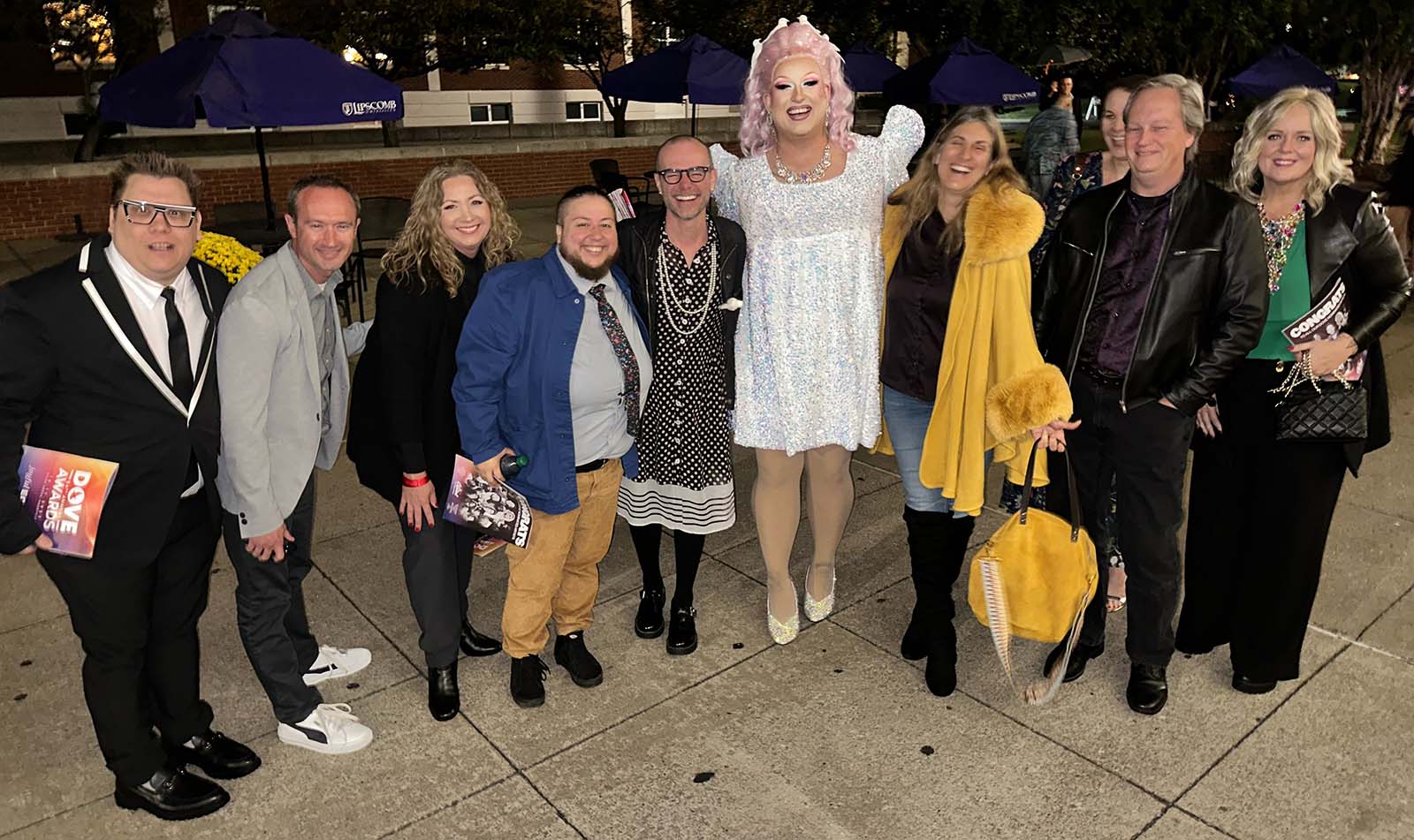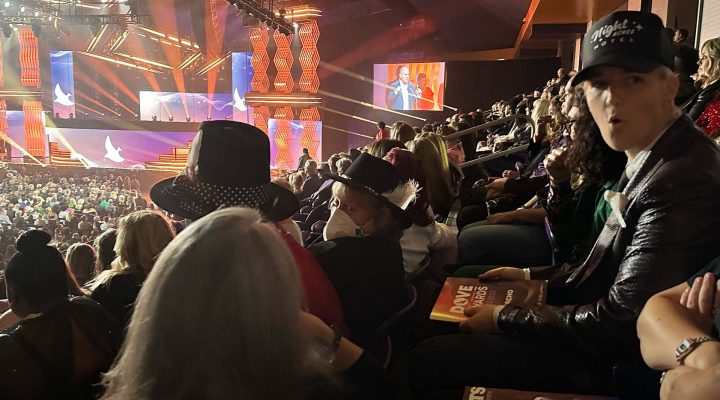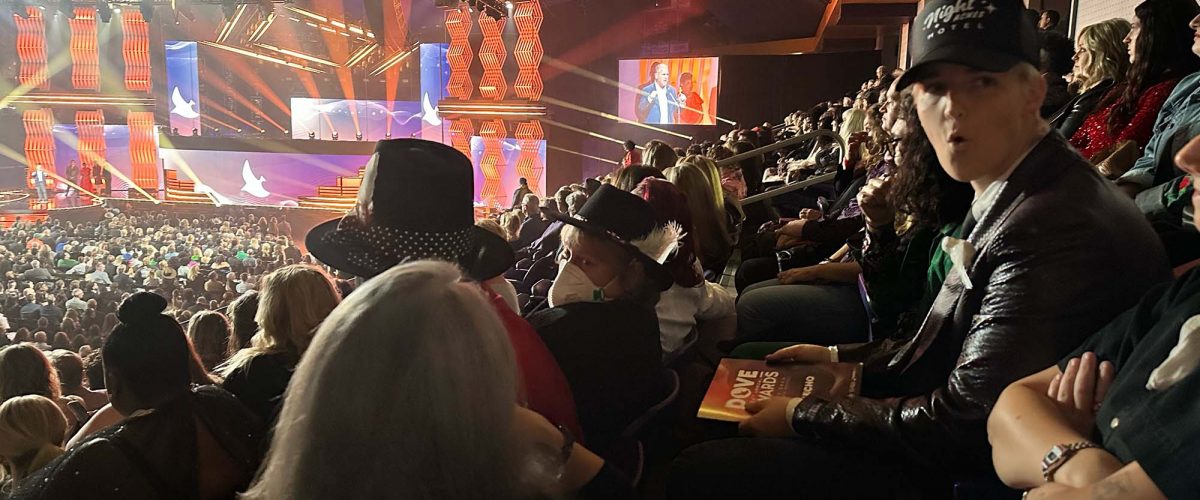As ticket holders began filing into Lipscomb University’s Allen Arena for the 54th annual GMA Dove Award ceremony last week in Nashville, a small crowd gathered by a clock tower near the entrance to the auditorium.
They came from all corners of the country: California, New Mexico, Wisconsin, Virginia and multiple spots in between. Some flew in for several days, others for as little as 12 hours. Some traveled with friends, others arrived completely alone. A pair of filmmakers from Toronto stood with the group, their focus not on catching a happenstance sighting of a big-name nominee, but rather an Uber dropping off a drag queen, a lesbian and a man in a dress.
Flamy Grant, whose album Bible Belt Baby and single “Good Day” both topped the CCM charts in August, openly gay singer-songwriter Grace Baldridge, who had two Christian music chart toppers this year under their stage name Semler, and indie artist Derek Webb, of the Christian band Caedmon’s Call, exited the Uber and headed straight toward the 30 or so people waiting to walk in solidarity into the arena, not as invited guests, but as attendees holding tickets for the cheap seats.
The plan to populate Section 103 — the nosebleed section — of the auditorium with queer representation and celebration of Flamy Grant and Semler’s achievements was hatched weeks earlier when the artists put out an open invite to their friends and fans to join them at the event.

Some of the Section 103 crew pose for a group photo outside the auditorium. (Photo: Matthew Lovegood)
A ‘calling’
“When Flamy Grant and Semler asked for support at the Dove Awards, I felt a strong calling to be there,” said Kristi Wheeler, who flew in from Charlotte, N.C. “My journey into Christian music began after I faced expulsion from Wheaton College for coming out as a lesbian.”
During that time, queer Christian artist Jennifer Knapp’s music became a lifeline for Wheeler, she said. “In my eyes, these artists epitomize what it means to be a true Christian. Their embrace is open to all, even when much of the Christian community says, ‘You’re not welcome here.’”
The calling Wheeler felt to be a part of the event was a common theme many of the artists’ supporters expressed.
Krystal Shipps, a therapist from the Kansas City area who specializes in religious trauma and makes mental health content for TikTok, said “the algorithm” brought her to Semler and Flamy. She said she’s followed Derek Webb since his Caedmon’s Call days and recently attended one of his house shows. When she learned about the plans to gather at the Dove Awards, she immediately thought, “I want to be a part of that” because she believes the artists “deserve a seat at the table.” Shipps hoped her presence might play “a small part in giving them more visibility.”
Power in presence
Matthew Lovegood, the singer-songwriter who performs as Flamy Grant, believes the act of being present was, indeed, powerful. “Each person in our fabulous little entourage held space for the thousands of people who couldn’t be there,” Lovegood said.
According to Webb, the act of holding space sends a powerful message: “We belong and, by extension, all of you who feel the same do too.”
“The victory was when we set foot in the arena,” said Webb, who donned a black and white polka dot dress, pearls, black tights and chunky shoes for the evening.
He opted instead to “leave that privilege at the door” and be “visibly aligned” with the people he was there to support.
While critics on social media have accused Webb of dressing for attention or publicity, he said it was more about alignment. With 25-plus years as a CCM insider, and friends in the auditorium presenting and receiving awards, Webb said it would have been “too easy to hide out.” As a cisgender white man, he opted instead to “leave that privilege at the door” and be “visibly aligned” with the people he was there to support.
Webb said it also would be easy to focus on the venomous comments online, but he has chosen instead to focus on the “beautiful” moments with the supporters who came and people who approached the group throughout the evening to take selfies or say hello.

The author (far left) surveying the crowd. (Photo: Cynthia Vacca Davis)
Strength in numbers
One of those people was Abiola Agoro, who was working the event as a PR/communications agent and videographer. Agoro got a text from their mother, also in attendance, saying she was sitting behind a drag queen. Agoro dropped everything.
“Seeing Flamy meant not only that I didn’t have to feel like I was the only one there as my authentic self, but also allowed me to lean into it instead of shrink from it,” Agoro said.
Flamy’s presence also was meaningful to Agoro’s mother: “It made my mom so much more comfortable. Knowing there are more people in the queer community makes her feel like I’m not so isolated and like she doesn’t have to protect me by herself.”
The unofficial queer student group at Lipscomb University gathered to meet the artists and get a boost of encouragement from them.
“It was a beautiful thing,” Webb said. Flamy Grant later tagged the university in a social media comment that read: “I hope your school does right by you soon and officially sanctions your gathering. Keep the faith and keep up the good work: you give me so much hope. If there’s anything this drag queen can ever do for you, just holler.”
“Silent support is useless to us. We need advocates and accomplices.”
According to Lovegood, a few people offered remarks that could be categorized as “secret support” — comments along the lines of: “What you are doing is great, but …” Lovegood said it is “frustrating to know there is all this silent support out there but no one seems willing to stand up and be a true ally. Silent support is useless to us. We need advocates and accomplices to show the same bravery as the 30 people who showed up in pubic solidarity.”
Webb’s thoughts drifted to people sitting much closer to the stage: closeted nominees and presenters he considers friends. “I know precisely who those people are — my friends and colleagues who I knew were there.” Webb hopes they looked up and saw the gathering as a source of “hope and strength.”
Christian nationalism?
From the perspective of the queer performers and their friends and allies, the ceremony itself sparked mixed emotions. “There were some amazing performances,” Lovegood said. “I particularly loved the surprise of seeing Take 6 bring the house down, which took me back to the days when I used to love CCM.”
Semler offered enthusiastic applause and occasional standing ovations for many of the performances, including one featuring TobyMac, whom they have criticized for failing to take a stand for queer inclusion.
“I was happily surprised at the strong effort to showcase a diverse range of artists and genres,” Lovegood added. “Women and people of color were frequently in the spotlight, and while I loved to see it, I couldn’t help but imagine what a Dove Awards that celebrated other areas of diversity could look like.”
But the musical highlights were not the biggest takeaway for many in the group. According to Lovegood, the performances were overshadowed by a “disturbing undercurrent of Christian nationalism that was bizarrely woven throughout the evening.”
“From Lauren Daigle’s lengthy and confusing Esther-inspired speech about some vague threat she warned Christians could soon be facing, to host Tauren Wells’ astonishingly tone-deaf and Zionist call to arms when discussing the current devastation in the Middle East, so much of the script felt designed to cast Christians in the role of victim and purposefully avoided any genuine self-reflection,” Lovegood said.
Webb concurred that the evening featured “more than a few Christian nationalistic rants.”
LP, a fan of Semler and Flamy Grant who flew from Pittsburgh to attend the event, said “the capitalism, Christian nationalism and performative nature of the Dove Awards was disappointing but not surprising.”
Grateful for being there
Kristi Wheeler will not be attending another Dove Award ceremony, but left feeling “profoundly grateful” for this year’s experience.
“What this event taught me is that there are many people and spaces that offer love, communion and empathy while challenging and enriching me,” she said.
That acceptance did not come from the Gospel Music Association, she explained, but from the people assembled in Section 103.
“I don’t yearn for acceptance from those who require a checklist to be fulfilled before granting love,” she said. “Instead, I want to be around people who genuinely understand and preach God’s love — and there are many of us out there.”
Related articles:
Why will Semler and Flamy Grant attend the Dove Awards, where neither is accepted?
Semler’s new song ‘Faith’ tops Christian music charts on iTunes
What Sean Feucht meant for evil, Flamy Grant experienced as good


